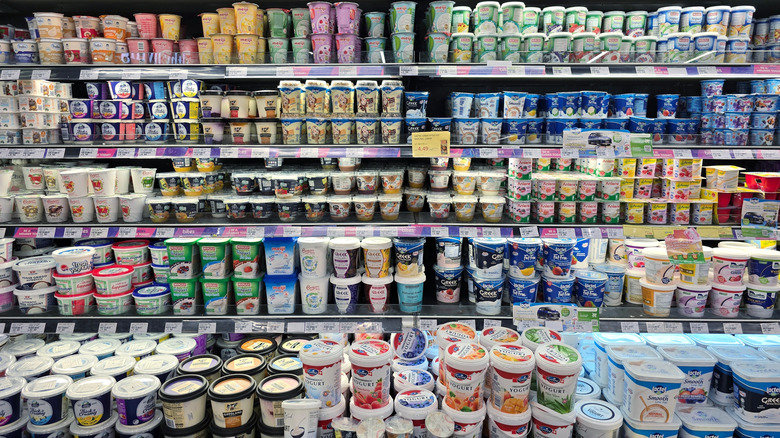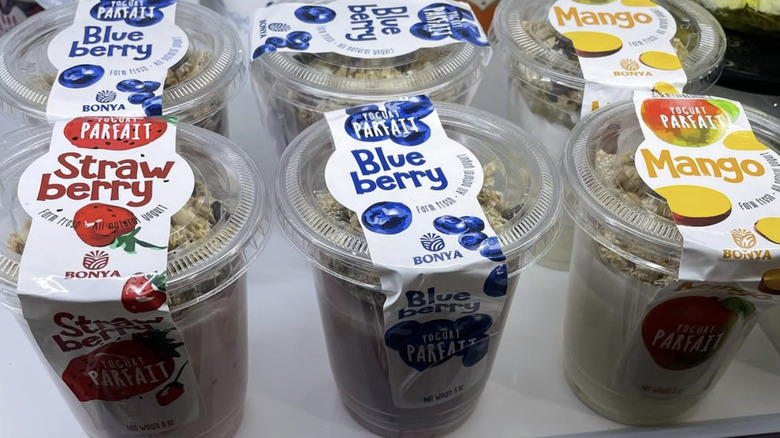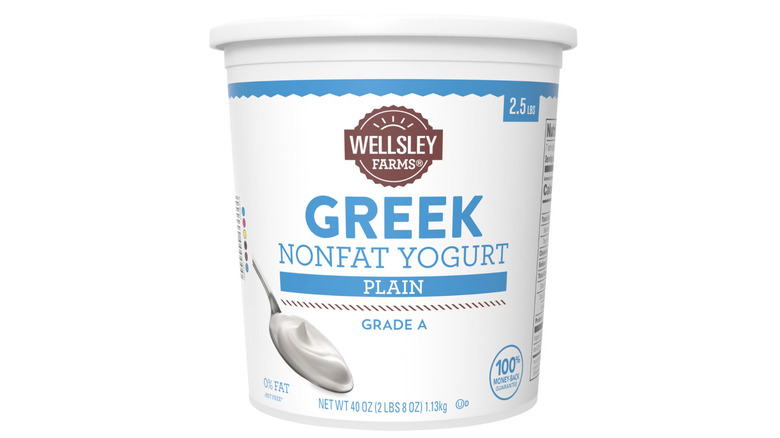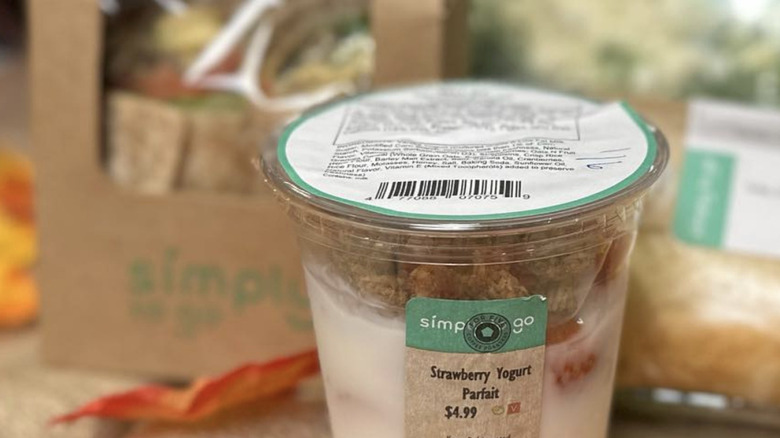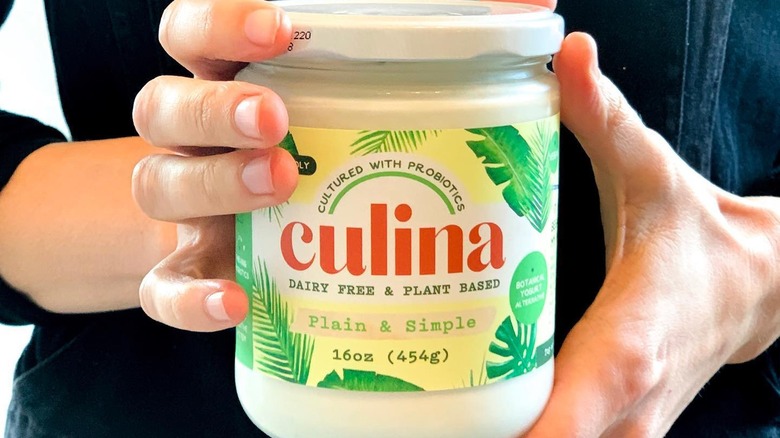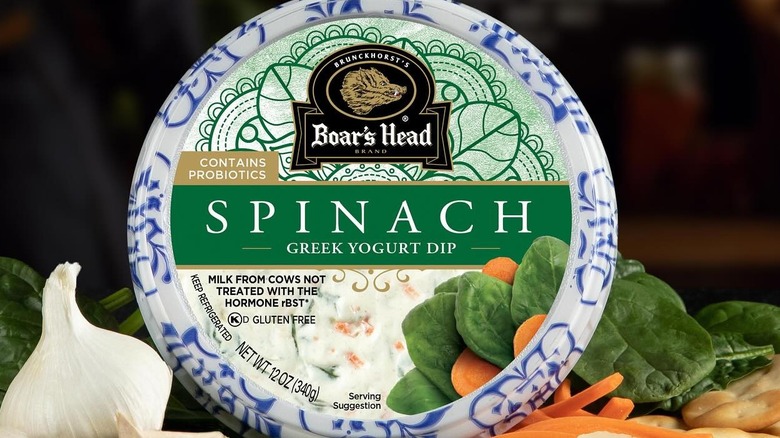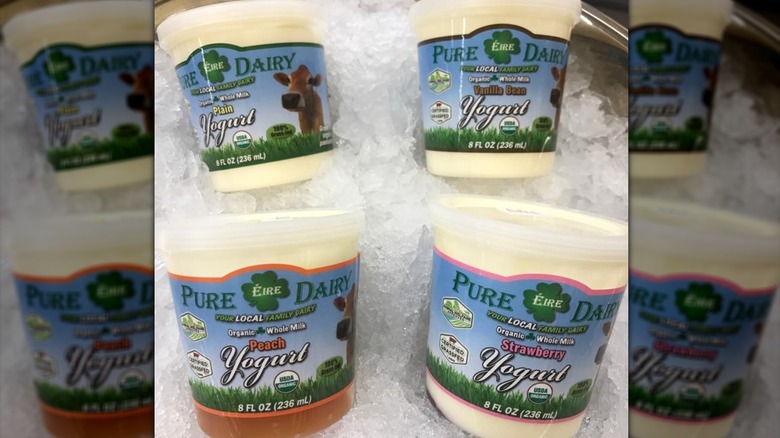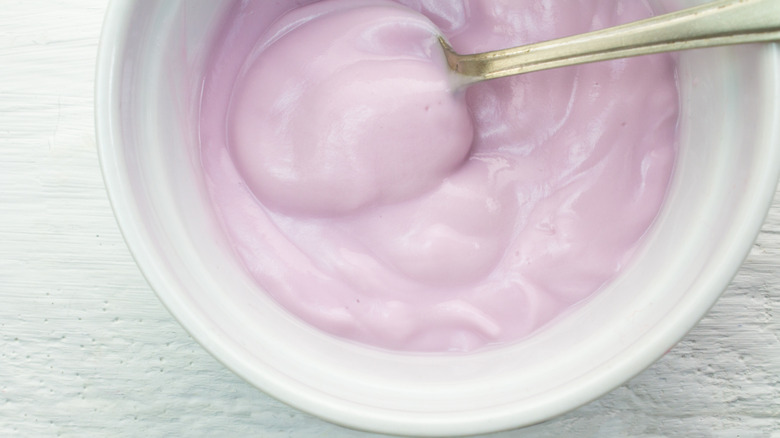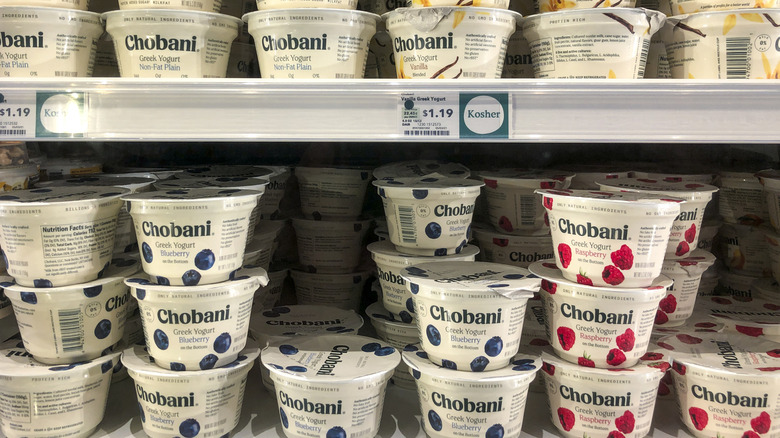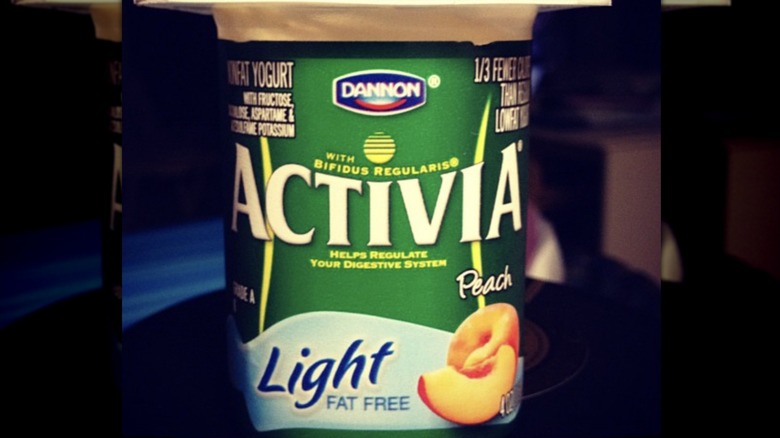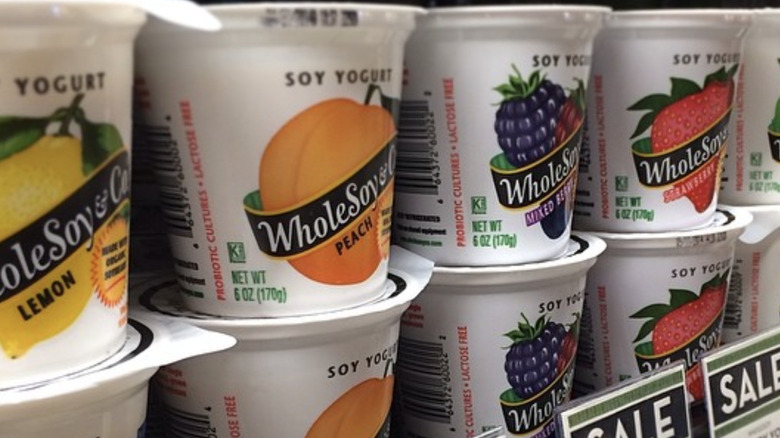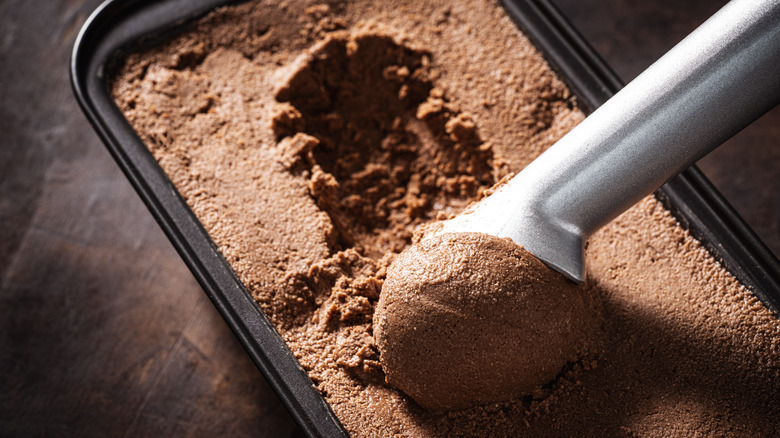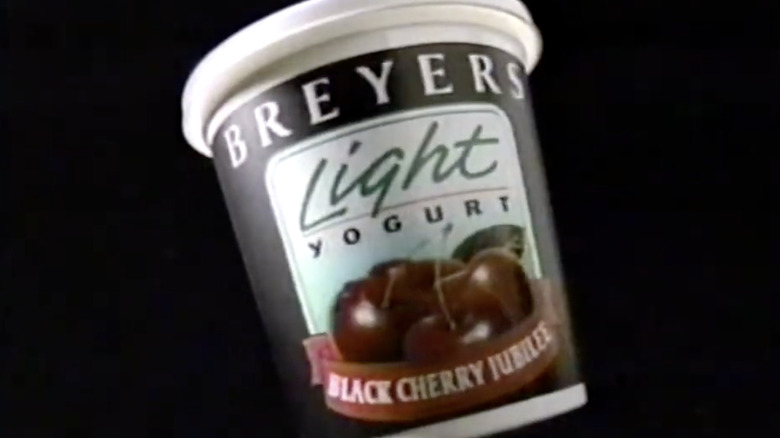The Biggest Yogurt Recalls In US History
There are many things to love about yogurt. It's portable, versatile, creamy, and delicious — then a recall happens and makes us question it all. Yogurt has been around for over 7,000 years, originating in what is now Turkey. In the 1900s, fruit-flavored yogurt emerged as a major hit with American consumers, leading to the rise of mega yogurt brands like Dannon. Yogurt's commercial appeal continued to surge into the 21st century. As more yogurt brands fill out the dairy section of grocery stores, the increase in options has led to an increase in yogurt recalls.
Mislabeled products, contamination from foreign objects, and the presence of foodborne pathogens are the most common reasons for food recalls. Yogurt companies have been plagued by all of them. Another quality control challenge yogurt faces pertains to its perishable nature. Issues with mold and spoilage have also contributed to some massive yogurt recalls. All recalls in the U.S. are monitored by the Food and Drug Administration (FDA) or the United States Department of Agriculture (USDA).
When a food product is recalled, it creates a huge financial setback for the manufacturers responsible for the problem and poses a serious risk to the health and wellbeing of the general public. Deviations in the commercial yogurt-making process have cost companies millions of dollars and threatened many people's lives. This list details some of the biggest and most destructive yogurt recalls to ever hit the American consumer market.
Bonya yogurt parfaits in 2025
In the first quarter of 2025, FOODAKAI's Global Food Recall Index indicated a sharp rise in dairy recalls. It also named dairy as the category responsible for the most food recalls in 2025 so far, with 395 products recalled worldwide by the end of March. With the "help" of the U.S. yogurt industry, that troubling statistic shows no signs of slowing down. Bonya, a yogurt parfait brand produced by Knockroe Inc. of Elizabethtown, Pennsylvania, recalled a lot of yogurt parfaits in March 2025 due to undeclared almonds.
12 flavors of Bonya Yogurt Parfaits were recalled after it was discovered that the granola portion of the parfaits contained almonds that were not indicated on the ingredients label. The Class I FDA recall posed a potentially life-threatening risk to consumers with a tree nut allergy. The yogurt parfaits were distributed in Massachusetts, New Jersey, New York, and Pennsylvania. The number of individual parfaits recalled was no joke: 113,676 units in total.
In May 2025, Knockroe Inc. issued a recall of its low-fat yogurt parfaits for the exact same reason. The low-fat yogurt parfait flavors that contained undeclared almonds were vanilla, strawberry, blueberry, raspberry, mango, and peach. Knockroe Inc. had distributed the mislabeled low-fat yogurt parfaits nationwide. Despite recalling such a substantial amount of product, no allergic reactions linked to Bonya Yogurt Parfaits were ever reported. An investigation into the mislabeling pointed to a temporary breakdown of Knockroe Inc.'s manufacturing process as the source of the problem.
Wellsley Farms Nonfat Greek Yogurt in 2024
Warehouse grocer BJ's Wholesale Club had a lot of inedible yogurt to dispose of in December 2024, after two flavors of its Wellsley Farms Greek Yogurt were recalled due to a foreign matter contamination. The foreign matter plaguing BJ's yogurt was pieces of plastic. There have been some huge BJ's recalls in the past, and unfortunately, its recent yogurt recall is right up there with the biggest of them.
One lot code of Wellsley Farms Plain Nonfat Greek Yogurt and one lot code of Vanilla Nonfat Greek Yogurt were implicated in the recall. Since the yogurts were being sold at BJ's, a store that specializes in bulk-packaged food items, both yogurt flavors were sold in 40-ounce containers. The recall accounted for a total of 15,834 cases of Wellsley Farms yogurt. The contaminated yogurt was distributed to BJ's facilities in Connecticut, Maryland, and Kentucky.
Although the recall affected the Wellsley Farms brand, which is exclusive to BJ's stores, BJ's was not the company that was responsible for initiating the recall process. The plastic-tainted Wellsley Farms yogurts were produced by HP Hood, a nearly 180-year-old company that's one of the largest dairy producers in the U.S. HP Hood did not provide an explanation for how the plastic pieces got into Wellsley Farms yogurt.
Sodexo yogurt parfaits in 2023
Sodexo is a bona fide behemoth of the prepared foods world, with an international presence. In the U.S., you're most likely to encounter Sodexo-packed goods at grab-and-go hotspots like college cafeterias or interstate rest stops. Yogurt parfaits produced by Sodexo are a big seller — unless they're being recalled by the thousands, like they were in May 2023. That was when Sodexo fell prey to one of the most common reasons for a food recall: undeclared allergens. In this case, the major allergen that went unlisted on the parfait's ingredients label was soy.
The mislabeled items included 8.53-ounce containers of Simply To Go Strawberry Yogurt Parfaits and 9.24-ounce containers of Simply To Go Blueberry Yogurt Parfaits. The parfaits were distributed to Sodexo Food Service locations in Massachusetts, New Hampshire, and Rhode Island. At the time of the recall, no instances of adverse reaction had been reported. However, keeping the mislabeled parfaits within consumers' reach could potentially cause a severe reaction or even death in individuals with soy sensitivities or allergies.
Sodexo's yogurt parfait recall was substantial; the total amount of recalled product weighed in at 36,701 pounds. Despite the recall taking a huge bite out of Sodexo's yogurt inventory, it didn't keep the company's parfait production down for long. Sodexo U.S.A. reported that 11,569 gallons-worth of its yogurt parfaits were ordered through Sodexo's Everyday app in 2024.
Culina yogurt in 2022
Even companies with earnest missions run into production errors every now and again. That's what happened with Culina, the plant-based yogurt brand from Eat Real Food LLC, in June 2022. At the time, Eat Real Food, based in Austin, Texas, was a young company specializing in all-natural, dairy-free yogurt. Eat Real Food was forced to recall a huge amount of plant-based yogurts sold under the Culina name after a very undesirable, man-made ingredient was found inside: glass.
Culina had to destroy 54,168 pounds worth of yogurt. The yogurts came in several different flavors, which included lovely-sounding creations like Blueberry Lavender, Bourbon Vanilla, Mango Orange Blossom, Peach Cashew, Plain & Simple, Strawberry Rose, and Sour Cherry Almond. It wasn't exactly a huge surprise how glass found its way into Culina's yogurts, as all of the recalled units were sold in glass jars.
Eat Real Food pointed to its co-manufacturer, Ponder Foods, as the source of the manufacturing mishap. The glass pieces within the yogurt were brought to Eat Real Food's attention by way of consumer complaints. As monumental as this yogurt recall was, no injuries from the glass were reported and Culina lives on. Nowadays, the plant-based yogurts are packaged in plastic containers.
Klondike Cheese Company Spinach Greek Yogurt Dip in 2022
The Wisconsin-founded Klondike Cheese Company was nearly 100 years old when it found itself on the wrong side of a big-time product recall in June 2022. For decades, Klondike Cheese Company was best known for its feta cheese. That was until 2013, when the company began producing Greek yogurt as well. With its Greek yogurt plant up and running, Klondike Cheese Company was tapped by deli giant Boar's Head to produce its Spinach Greek Yogurt Dip. Production for the Boar's Head dip hit a snag when multiple lots had to be recalled because the dip contained fragments of plastic.
12,365 cases of Spinach Greek Yogurt Dip from distribution — a recall that weighed in at 74,190 pounds. The faulty containers were only distributed in Florida, which may have helped both Boar's Head and the Klondike Cheese Company keep the recall from causing a stir in the media. There were no confirmed injuries connected to the recall, but Klondike Cheese Company wasn't taking any risks.
Bigger troubles were on the horizon for Boar's Head, though. In 2024, Boar's Head had one of the worst deli meat recalls ever, when 7.2 million pounds of listeria-tainted products were linked to an outbreak that killed 10 people.
Pure Éire Dairy yogurt in 2021
Recalling mass amounts of yogurt is inconvenient, but recalling mass amounts of yogurt because it caused a food poisoning outbreak is downright tragic. That's what happened to Pure Éire Dairy in May 2021. The company, which made multiple dairy products, announced it was pulling all of its yogurt products after the Washington State Department of Health (DOH) linked its product to an ongoing E. coli O157:H7 outbreak.
As the DOH investigated the outbreak, which spanned multiple counties and was primarily affecting small children, a common connection between multiple ill individuals was the consumption of Pure Éire Dairy Yogurt, also sold under the brand PCC Community Market. Pure Éire Dairy recalled the entire yogurt line and ceased yogurt production at its facility. At the time, 11 E. coli infections had been confirmed, with seven of the individuals requiring hospital treatment. Three patients (aged between one and seven years old) developed hemolytic uremic syndrome, a severe reaction to E. coli sickness that can lead to kidney failure.
Pure Éire Dairy cooperated with the investigation yet retained an air of disbelief that its small agricultural operation could be responsible for the outbreak, which reached 17 cases by June 2021 and spawned six lawsuits. Per Pure Éire Dairy's Facebook posts, tests of the company's product performed by state public health officials were negative for E. coli. But on July 18, 2021, Pure Éire Dairy posted to Facebook again, informing customers that it would be permanently shuttering all of its dairy production.
Meijer yogurts in 2018
If you're familiar with Meijer Supermarkets, you probably know that they are a major player in the orbit of U.S. grocery store chains. If you're a regular Meijer shopper, you might also remember the hefty recall of its store-brand low-fat and Greek yogurts in February 2018. The recall occurred because five flavors of Meijer's Greek Yogurt as well as its Low-Fat Blueberry Yogurt were contaminated by small pieces of glass. Meijer found out about the foreign material contamination when a customer returned a yogurt cup with two pieces of glass inside.
This discovery led to Meijer recalling 32,315 pounds of yogurt. The recall affected Greek and low-fat yogurt cups sold in 6-ounce and 5.3-ounce portions. The recalled yogurts were sold in Meijer stores throughout Michigan, Ohio, Indiana, Illinois, Kentucky, and Wisconsin. Meijer advised consumers who had purchased the yogurts — all of which had an expiration date of March 18, 2018 — to dispose of them or return them to the place of purchase for a full refund. It was a lot of yogurt for Meijer to throw away, but the silver lining was that no injuries related to the glass contamination were reported.
Chobani yogurt in 2013
In the new millennium, Chobani is a force to be reckoned with. Chobani began as a Greek yogurt company with a humble operation in 2005, only to explode into one of the top-selling yogurt brands in the U.S. today. Back in 2013, when Chobani was still beneath its 10-year milestone, a humongous recall threatened the company's bright future. It all started with reports that containers of Chobani were swollen, smelled sour, or were fizzy and had a taste similar to wine. Then, consumers began reporting that Chobani yogurt had made them sick.
On September 5, 2013, Chobani recalled all flavors and sizes of its Greek yogurt due to spoilage — 91 different products in total. One day later, Chobani reported that testing of the recalled products indicated the presence of a type of mold called Mucor circinelloides. All of the spoiled yogurts were produced in Chobani's facility in Twin Falls, Idaho, which opened in December 2012. The facility was shut down for cleaning following the recall.
Chobani maintained that Mucor circinelloides was not a foodborne pathogen and did not pose a significant health risk to most consumers. This was a partial stretch of the truth. Mucor circinelloides is the most virulent fungus there is and is particularly dangerous to immunocompromised people. Chobani's moldy yogurt sickened at least 300 people and prompted the filing of a class action lawsuit, which was eventually dropped.
Dannon Activia Light Nonfat Peach Yogurt in 2012
Dannon was having one crisis after another with its Activia yogurt fall of 2012. On October 5, 2012, the brand recalled 19,915 cases of Activia Light Nonfat Peach Yogurt due to product mislabeling. This was not the typical undeclared allergen scenario we see so often with mislabeling recalls. The FDA's public record of the October 2012 recall doesn't specify how the nonfat peach Activia was mislabeled, yet there is evidence to suggest that it was connected to Dannon's ongoing controversy with misrepresenting Activia's health benefits.
In the early 2010s, Dannon faced class action lawsuits for exaggerating the ways Activia could help the human body. Dannon ramped up its advertising for Activia in the late 2000s, boasting the digestion-regulating and immune system-boosting powers of the yogurt (actress Jamie Lee Curtis was Activia's spokeswoman). These claims were Dannon's way of justifying Activia's higher price tag. In 2010, Dannon settled a class action lawsuit in the U.S. for $45 million. In September 2012 — days before the October recall — Dannon also settled a $1.7 million class action lawsuit in Canada. One provision of the settlement was that Dannon would reword parts of its yogurt labels.
To cap off Dannon's troubling year with Activia Light Nonfat Peach Yogurt, the company issued another recall for it on October 23, 2012. This time, brazen health claims weren't to blame. A faulty machine part caused 2,430 cases of its peach Activia to be contaminated by metal fragments.
WholeSoy & Co. yogurt in 2007
In the mid-2000s, dairy-free yogurt was an emerging subset of the yogurt industry. Back then, consumers who wanted to enjoy the health benefits of yogurt without the diary component turned to brands like WholeSoy & Co., which used soy (the go-to dairy replacement of that era). Since the presence of dairy-free yogurt in grocery stores was limited, a WholeSoy recall in the summer of 2007 did not fly under the radar. WholeSoy recalled 34,656 cups of blueberry yogurt on June 7, 2007 because it actually did contain dairy.
The oversight was brought to WholeSoy's attention in the worst way: Two consumers who had eaten the yogurt experienced allergic reactions. Allergy tests conducted on WholeSoy Blueberry yogurt samples were positive for dairy, prompting the San Francisco-based company to recall the product. That wasn't the end of it. On June 12, 2007, WholeSoy expanded its undeclared allergen recall.
The voluntary recall expansion included more blueberry yogurt (71,508 cups in total) and 17,112 cups of mixed berry yogurt as well. The yogurts were sold in 6-ounce cups and distributed nationwide. Further testing indicated that a batch of blueberries used in both yogurt flavors was the source of the undeclared dairy. No explanation of how dairy made its way into the fruit was given. WholeSoy was able to move past the recall and have several more successful years of business but struggled after the manufacturing facility it partnered with shut down in 2013. WholeSoy ceased operations in 2015.
Friendly's frozen yogurt in 1995
When Friendly's had a giant frozen yogurt recall at the very end of 1995, food recalls weren't being announced practically every other week like they are now. But before the rise and fall and resurgence of Friendly's, the classic New England ice cream shop turned casual restaurant was first established in 1935 and has been selling its ice cream at the retail level since 1989. Friendly's also retailed frozen yogurt, and it was a welcome sight for shoppers who wanted a sweet treat that's lower in fat than ice cream. Then, in December 1995, a listeria scare disrupted Friendly's frozen yogurt production and triggered a recall of two flavors.
Friendly's Chocolate Fudge Brownie Yogurt and Purely Chocolate Yogurt were the flavors potentially adulterated by listeria bacteria. During a routine inspection, the FDA found listeria contamination at Friendly's processing plant in Troy, Ohio. Upon discovery, Friendly's halted production and recalled one lot of Chocolate Fudge Brownie Yogurt and one lot of Purely Chocolate Yogurt. The recall amounted to 30,000 half-gallon frozen yogurt containers. The recalled frozen yogurt was sold in 15 states. Listeria poses a serious threat to frozen foods because the microbes are able to survive frigid temperatures.
Breyers yogurt in 1989
In early January 1989, Breyers yogurt was inciting panic. Grocery chain Acme pulled Breyers yogurts from 166 locations in three states. These measures were taken in response to an extremely disturbing event that took place in Haddonfield, New Jersey. On January 3, 1989, 17-year-old Thomas Lee ate a small amount of Breyers Black Cherry Yogurt, began convulsing and spitting up blood, and then went into a coma. The FDA tested the yogurt container Lee ate from and found traces of cyanide.
After reports circulated that the yogurt Lee consumed was purchased at an Acme in Westmont, New Jersey, Acme removed Breyers yogurt from every location in the Delaware Valley. Breyers' parent company, Kraft, recalled all 8-ounce Breyers yogurts from stores in nine counties within the Philadelphia metro area. Investigators noted that the container Lee ate from did not display puncture wounds or other signs of tampering. Of the 146 units of Breyers yogurt that were tested, including some from the same production lot as the one Lee ate, none of them were positive for cyanide.
The yogurt Lee ate was part of an eight-pack purchased on January 1, 1989. Two containers were eaten by his parents with no adverse effects. Lee died from cyanide poisoning on February 7, 1989. The medical examiner ultimately ruled the poisoning a suicide. Lee acquired access to the cyanide through his father's laboratory and had allegedly been suffering from depression.
